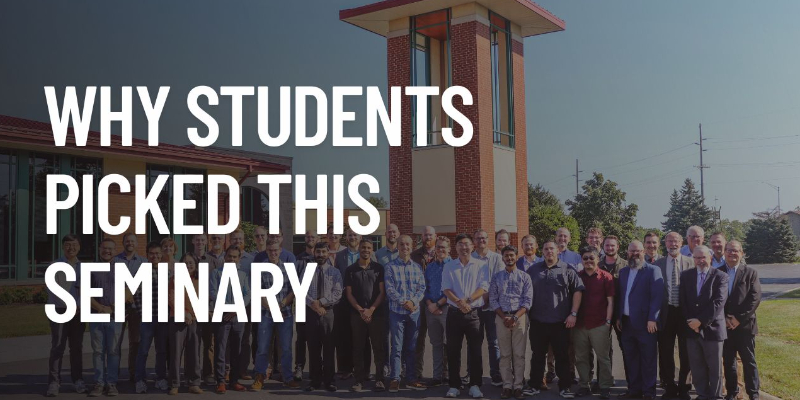
By His Spirit and Word
This article was previously published in the forthcoming March 2022 issue of The Messenger.
“Our purpose is to better equip students and pastors to plant and perpetuate Reformed, ordinary means of grace churches to carry out Christ’s Great Commission.” (Center for Missions & Evangelism purpose statement)
Perhaps the greatest folly in the contemporary church’s affection for worldly strategies in missions and evangelism is the self-defeating nature of the whole enterprise. If the church adopts a pragmatic method in order to be successful in fulfilling its mission, the church compromises its reliance upon Christ’s Spirit and Word. Whenever the church adopts a method for achieving success in its mission that does not conform to the one Christ has appointed, the church ceases to rely upon the promise that Christ will build His church upon the testimony of the apostles (Matt. 16:13-20; cf. Eph. 2:20).
If Christ is the one who builds the church, then He has the right to determine the strategy that He wishes to use to build it. Otherwise, the church will be tempted to act as though the gathering of the people of God depends upon whatever means it devises. Christ is not only the substance of the church’s message. Christ is also the substance of the church’s method. You cannot preach the Christ of the Scriptures while relying upon your own clever schemes to accomplish what He has promised to accomplish in His own way.
In the Old Testament story of the Lord’s victory over the Midianites through Gideon, we witness something “typical” regarding the Lord’s redemptive work. In the account in Judges 6 and 7, the Lord deliberately devises a strange, paradoxical strategy for securing victory. The Lord’s chosen instrument, Gideon, is an unimpressive sort, the youngest son in a no-account family from one of the least of the tribes of Israel. When Gideon is commissioned to lead Israel in battle against the Midianites, we are told the Spirit of the Lord “clothed” him (Judges 6:34). Amazingly, when thirty-two thousand men heed Gideon’s call to arms, the Lord intervenes and whittles the number of men down to a meager three hundred. Furthermore, the weapons with which Gideon and his little band of three hundred enter the fray are clay pots and trumpets. Never in the history of human warfare has there been a more lopsided set of combatants: on the one side, young Gideon with three hundred novices, armed only with pots and trumpets; on the other side, a vast number of Midianite armed men, who fill the valley like locusts overrunning a field in mid-summer.
But the key to the miraculous victory that Gideon wins over the Midianites lies in the Lord’s deliberate strategy to employ human weakness to achieve His redemptive purposes and thereby magnify His own power and grace. In the words of the Lord to Gideon, “The people with you are too many for me to give the Midianites into their hand, lest Israel boast over me, saying, ‘My own hand has saved me’” (Judges 7:2). God chooses a strategy of weakness to shame the strong, and to cause His people to boast alone in His power.
I rehearse this Old Testament story of God’s work of redemption in the days of the Judges in order to illustrate the most important feature of the Reformed confessions’ doctrine of the church and the means of grace: the church of Jesus Christ is no human project, but a work of God’s grace from first to last. Therefore, the church is not at liberty to undertake its mission by any other means than those which the Lord has appointed. If the Lord has chosen to employ means that appear foolish and weak to the world—gospel preaching and teaching, the administration of the sacraments of baptism and the Lord’s Supper, and fervent prayer—so be it.
The simple truth is that the Lord is jealous for His glory. The Lord wants His people to boast alone in Him. This simple truth is sufficient to sweep away all the folly and proud presumption of those who would undertake to build the church by their own devices. However strong, wise, and clever our strategies and methods may appear to be, if they depart from the chosen means that the Lord is pleased to use to gather His people to Himself, they will inevitably prove to be weak and foolish. Only when the church employs the means Christ has appointed, and to do so in reliance upon the power of His Spirit, will the church be able to rest its faith in the power of God rather than the wisdom of men (1 Cor. 2:5).
As the work of Mid-America’s new venture, the Center for Missions and Evangelism, begins, may this core conviction regarding the power and fruitfulness of Christ’s Word and Spirit in the gathering of His church be a constant source of encouragement to us.

Dr. Cornelis Venema serves as the President of Mid-America Reformed Seminary, as well as a Professor of Doctrinal Studies.
Recent articles




